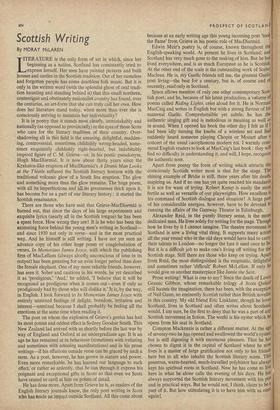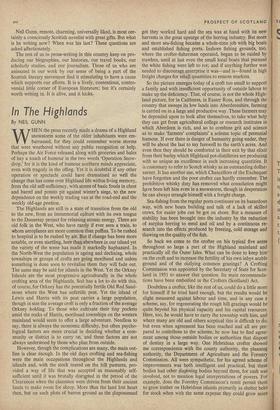Scottish Writing
By MORAY McLAREN LITERATURE is the only form of .art in which, since her beginning as a nation, Scotland has consistently tried to express herself. Her men have painted pictures and built houses and castles in the Scottish tradition. Out of her nameless and forgotten people has come deathless folk music. Rut it is only in the written word (with the splendid ghost of oral tradi- tion haunting and standing behind it) that this small northern, contentious and obstinately nationalist country has found, over the centuries, an art-form that she can truly call her own. How does her literature stand today, when more than ever she is consciously striving to maintain her individuality? , It is in poetry that it stands most clearly, unmistakably and nationally (as opposed to provincially) in the eyes of those Scots who care for the literary tradition of their country. Over- shadowing all in this field is the amusing, delightful, madden- ing, controversial, sometimes childishly wrong-headed, some- times exquisitely childishly right-hearted, but indubitably inspired figure of C. M. Grieve—or, in his poetic pseudonym, Hugh MacDiarmid. It is now about thirty years since the Krakatoa-like eruption of MacDiarmid's A Drunk Man Looks at the Thistle suffused the Scottish literary horizon with the traditional volcanic glow of a South Sea eruption. The glow and something more than the glow remains. The huge poem, with all its imperfections and all its greatnesses thick upon it, has become for us a part of our literary history: it started the Scottish renaissance.
There are those who have said that Grieve-MacDiarmid is burned out, that since the days of his large experiments and exquisite lyrics (nearly all in the Scottish tongue) he has been a spent force. How wrong they are! It is he who has been the animating force behind the young men's writing in Scotland— and since 1930 not only in verse—and in the most practical way. And he himself is still writing. I have not yet seen an advance copy of his other huge poem or conglobulation of verses, In Memoriam James Joyce, with which the publishing firm of MacLellans (always aloofly, unconscious of time in its output) has been gestating for an even longer period than does the female elephant. One of my most reliable friends, however, has seen it. Sober and cautious in his words, he yet described it as 'prodigious.' And,' he added, 'I believe that it will be recognised as prodigious when it comes out—even if only as prodigiously bad by those who will dislike it.' It is, by the way, in English. I look forward to In Memoriam James Joyce with entirely unmixed feelings of delight, boredom, irritation and interest—unmixed because I shall probably be feeling all the emotions at the same time when reading it.
The poet on whom the explosion of Grieve's genius has had its most potent and oddest effect is Sydney Goodsir Smith. This New Zealand lad arrived with us shortly before the last war by way of England and Oxford at an undergraduate age. It is an age he has remained at in behaviour (sometimes with irritating and sometimes with amusing manifestations) and in his prose writings—if his effusions outside verse can be graced by such a term. As a poet, however, he has grown in stature and power. Even more rema4cable, he has learned our language to such effect,' or rather so ardently, that he can through, it express his poignant and exceptional gifts in Scots so that even we ,Scots have ceased to cavil at him on points of detail.
He has done more. Apart from Grieve he is, as readers of the English literary journals know, the only poet writing in Scots who has made an impact outside Scotland. All this came about because at an early writing age this young incoming poet `tool: the flame' from Grieve in his poetic role of MacDiannid.
Edwin Muir's poetry is, of course, known throughout the English-speaking world. At present he lives in Scotland: and Scotland has very much gone to the making of him. But he has lived everywhere, and is as much European as he is Scottish At the other end of the scale is the outstanding work of Sorley' Maclean. He is, my Gaelic friends tell me, the greatest Gaelic poet living—the best for a century, but is, of course and of necessity, read only in Scotland.
Space allows mention of only one othgr contemporary Scot. tish poet; and he, because of his latest production, a volume of poems called Riding Lights, cries aloud for it. He is Norman MacCaig and writes in English but with a strong flavour of his maternal Gaelic. Comprehensible yet subtle, he has the authentic singing gift and is melodious in meaning as well as in sound. When I opened his book the other day I felt as if I had been idly turning the knobs of a wireless set and had suddenly heard someone playing Chopin or Mozart after 3 concert of the usual cacophonous modern rot. I warmly cony mend English readers to look at MacCai's last book : they will find no difficulty in understanding it, and will, I hope, recognise the authentic note.
Apart from poetry the form of writing which attracts the consciously Scottish writer most is that for the stage. The shining example of Bridie is still, three years after his death. inspiring us. And if no one has yet quite reached his standards it is not for want of trying. Robert Kemp is easily the most fertile as well as versatile of our playwrights. How excellent is his command of Scottish dialogue and situation! A large part of his considerable energies, however, have to be devoted to running the affairs of the Gateway Theatre in Edinburgh.
Alexander Reid, in the purely literary sense, is the more dedicated man. He lives solely for writing for the stage. Though how he lives by it I cannot imagine. The theatre movement in Scotland is now a living vital thing. It supports many actors all the year round who in the old days would have had to carrY their talents to London—no longer the lure it used once to be But it is a difficult job to make one's living off writing for the Scottish stage. Still there are those who keep on trying. Apart from Reid, the most distinguished is the enigmatic, delightful and sometimes rather 'difficult' Robert McLellan. If only be would give us another masterpiece like Jamie the Saxt. Prose writing! What is one to say? Since the death of Lewis Grassic Gibbon, whose remarkable trilogy A Scots Quhair still haunts the imagination, there has been, with the exception of Neil Gunn, no eminently Scottish rathei than British novelist in this country. My old friend Eric Linklater, though he loves Scotland, lives in Scotland and often writes about Scotland. would, I am sure, be the first to deny that he was a part of an!' Scottish movement in fiction. The world is his oyster which fle opens from his seat in Scotland.
Compton Mackenzie is rather ,a different matter. At the age of seventy-two he has opened and swallowed the world's oyster, but is still digesting it with enormous pleasure. That he has chosen to digest it in the capital of Scotland where he no lives is a matter of large gratification not only to his friends here but to all who inhabit the Scottish literary scene. This generous, warm-hearted, much-travelled polyhistor has alwaYs kept his spiritual roots in Scotland. Now he has come to live here in what he alone calls the evening of his days. He has always supported the Scottish literary movement with his pee and in practical ways. But he would not, I think, claim to be a part of it. But how stimulating it is to have him with us one° again!, Neil Gunn, remote, charming, universally liked, is most cer- tainly a consciously Scottish novelist with great gifts. But what is he writing now? When was his last? These questions are asked affectionately.
The rest of us in prose-writing in this country keep on pro- ducing our biographies, our histories, our travel books, our scholarly studies, and our journalism. Those of us who are animated in our work by our sense of being a part of the Scottish literary movement find it stimulating to have a cause which supports our efforts. It is a lively, contentious, contro- versial little corner of European literature; but it's certainly worth writing in. It is alive, and it kicks.


















































 Previous page
Previous page